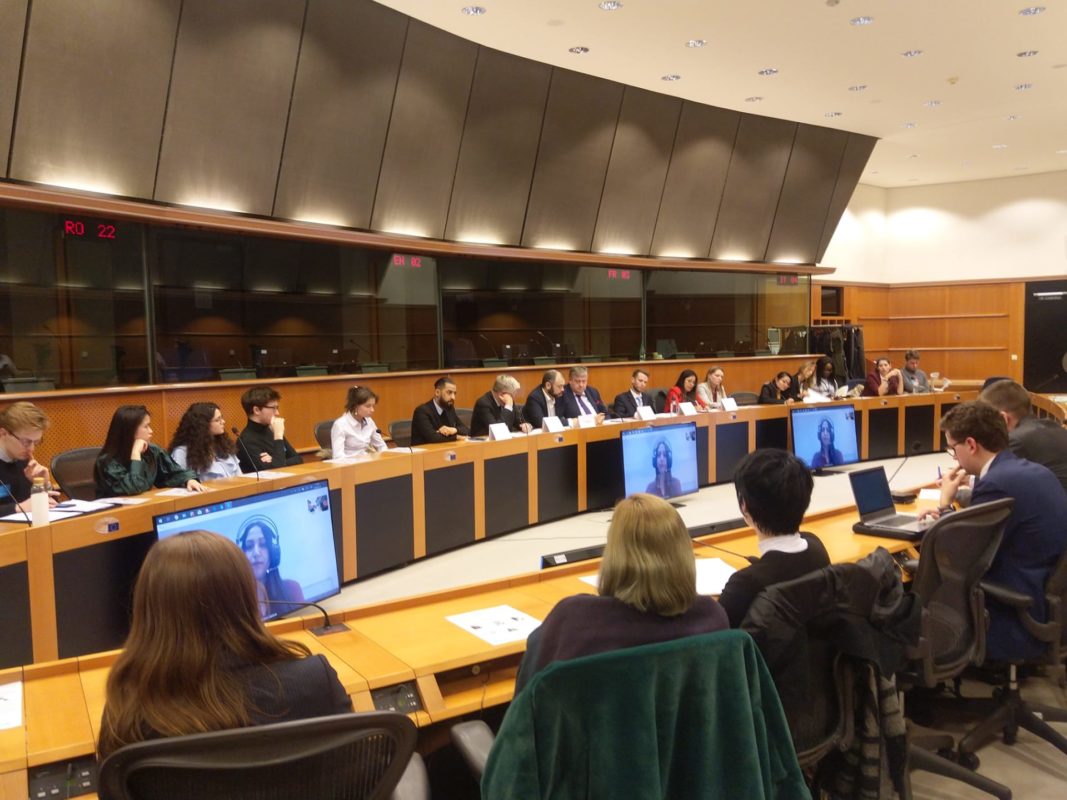On February 20, 2020 Marc Tarabella MEP – member of S&D and Vice Chair of the Delegation for Relations with the Arab Peninsula – hosted a conference on the “Culture of impunity in Bahrain: what is the role of the EU” at the European Parliament. This event was co-organised by the European Centre for Democracy and Human Rights (ECDHR) and the Université Libre de Bruxelles Model United Nations (MUN) team.
Speakers included Marc Tarabella MEP, Mr Gianfranco dell’Alba, Chair of the Board of No Peace Without Justice, Ms Dima Samaro, Access Now’s MENA Policy Associate based in Tunis, Professor Christian Olsson, director of Recherche et Etudes en Politique Internationale (REPI) and Lecturer at Université Libre de Bruxelles, Mr Yusuf Alhori, Bahraini activist, and Juliette Haquehua, member of the ECDHR team. The panellists shared their insight and expertise with KU Leuven and ULB students.
The speakers gave an overview of the situation in Bahrain and highlighted the widespread culture of impunity, which has increased since 2011. Abuses and human rights violations are common in every sector of the Kingdom of Bahrain’s society – at school, workplaces, in police practices and in prisons – and human rights defenders, political activists and protesters are particularly targeted with reprisals such as citizenship revocation.
Moreover, the Shia community is constantly discriminated against by the authorities, without any repercussions. The numerous reports of Human Rights breaches that International Organisations and NGOs, such as No Peace without Justice or the European Centre for Democracy and Human Rights, continue to receive is evidence of a lack of accountability in Bahrain.
Furthermore the panellists argued that Bahrain “missed an opportunity with the Bahrain Independent Commission of Inquiry (BICI) report to peacefully reform the country” but instead maintained a system where every institution is controlled by the Sunni royal family, preventing any sanction from being taken against Human Rights violators and abusers. Since 2011, the state has escalated its practices to control its citizens, these have been facilitated by the use of new technologies. The last cybercrime laws enacted in 2014 and 2019 allowed for a wide interpretation of terrorism and have consequently enabled for the state to censor critical content and lead state prosecution of human rights defenders. Thus criminalising free speech online as was demonstrated by the charges brought against Nabeel Rajab for retweeting content critical of Saudi Arabia’s bombing campaign in Yemen.
This culture of impunity in Bahrain has led to a profound breach in the population’s trust with the state. The difficulty for Bahraini citizens to reform the system from the inside can be traced back to the widespread arbitrary detention of young protesters, the high unemployment rate – especially amongst the youth – and the exclusion of the Shia community from society that, added to the violent government’s answer to the 2011 protests, led to a break down of the social contract. In Bahrain, as the panel discussed, power is concentrated in the King’s immediate family and entourage. Senior positions in the security sector are directly appointed at the King and his direct entourage’s discretion consequently, every institution able to harness power in the country has an interest in either supporting the King or to follow his lead.
This led the panel to discuss the role of the European Union and especially how the European Parliament could have a positive impact on the protection of human rights.
Negotiations previously led by the European Union failed after the crackdown. Since then, the European Parliament has tried to bring political representatives and opposition leaders together in order to address the situation of human rights in Bahrain. Apart from negotiations, the speakers recommended the European Parliament to take a more political position on human rights, such as incorporating the European Magnitsky act into its foreign policy. The High Representative and Committees related to Human Rights such as the Subcommittee for Human Rights have been presented as the EU democracy promotion bodies abroad, and should engage more with Human Rights violations. More protection and rights should also be granted to targeted Bahraini who have sought asylum in Europe. Most of them have been rendered stateless in reprisal for their activism and are consequently deprived from political, economic, social rights and protections.
The European Centre for Democracy and Human Rights (ECDHR) welcomes the calls made by the panellists for the European Union to:
- Continue raising awareness through parliamentary activities
- Push for the establishment of an international mechanism holding leaders accountable
- Implement a European Magnitsky Act

